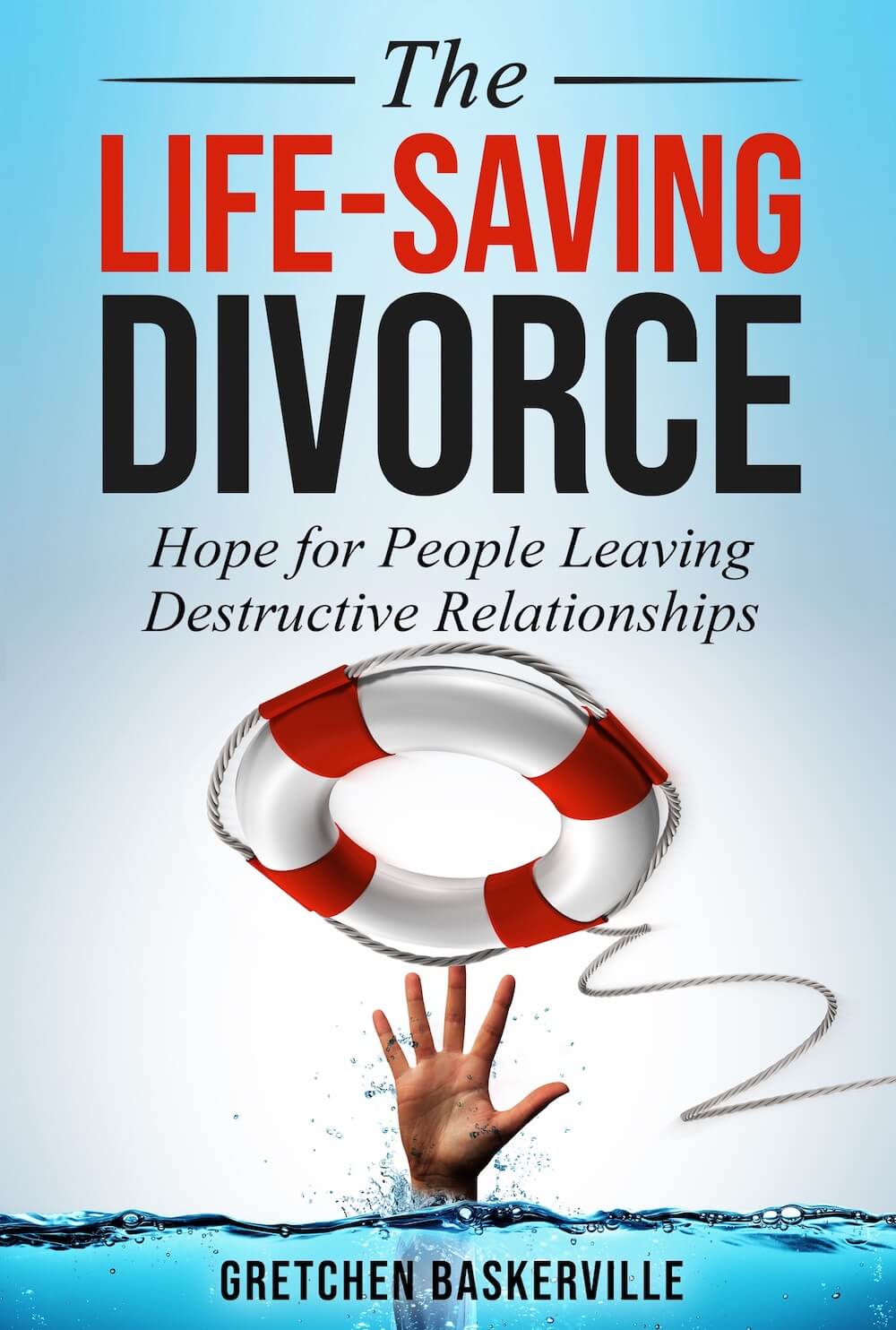Escape Plan: If You Are Thinking About Leaving
(UPDATED Aug 2021)
An important note: These are basic lists for people who are in difficult relationships but not in physical danger right now. If you are in danger, get to safety any way you can, or call 9-1-1, or contact a domestic violence shelter or www.TheHotline.org Phone: 1−800−799−7233
INTRODUCTION: Are you getting worn down by a destructive marriage, but not sure about divorce? If you decide to leave (and that is 100% your decision), or if you are not sure at this point, here are some tips to make the process better (meaning lower conflict, fairer, faster, with fewer attorney and court fees). You don’t need to do all of them-or any of them-but doing a few might make your life a little easier.
Do not tell your spouse you are divorcing until you are ready to go. In fact, often it’s best to let them find out you have filed when the legal papers are served to them, and to be in a safe place at that time.
When you tell your spouse you are leaving, separating, or divorcing, some may take it in stride, but brace yourself for the possibility of a complete personality change. Some spouses who are normally mild-mannered become aggressive and physically violent when they realize the stability of their life, their finances, and their public image are at risk. Some will immediately become obsessed with money and clean out the bank accounts. Some may threaten you with weapons, even if they never had before. (Depending on the state, you may be able to remove weapons from the house. Here’s the link to gun and firearms laws in each state: https://www.disarmdv.org/)
The Escape Plan for Those Considering Separation or Divorce
THE DOCUMENTS LIST
Gather these items, if possible. If not, your attorney can do this. If you need to get to safety now, don’t wait to get these. I interviewed a divorce attorney, and he said one of the biggest mistakes his clients make is waiting until they have all financial documents before they file for divorce. (Your attorney is able to get bank balances, retirement vesting, and other financial documents. That’s their job. So if you’re in a dangerous situation, get out now, and don’t wait to finish this list.)
- Cash and bank accounts: Make copies of statements for checking, savings, and money market accounts. Get the login, passwords, PINs (if any), and have an ATM card.
- Investment accounts: Fidelity, Betterment, WealthFront, Vanguard, etc. Make copies of statements or take screenshots of the totals for these investment and brokerage accounts.
- Tax Returns: Photocopy or photograph the past three years of tax returns, including every page. Include any letters from the IRS or your state claiming that you owe money or are due a refund.
- Retirement accounts: Photocopy or photograph statements from IRAs, 401(k)s, State Teachers Retirement (STRS), federal retirement plans, pension plans, stocks, bonds, or mutual funds. It’s important to have these listed and with a plan on how they will be divided before the divorce decree is signed, otherwise their new spouse may get funds that may rightfully be yours. Talk to an attorney about hiring a QDRO (“quadro”) to have this done legally and correctly.
- Social Security and Medicare numbers: Photocopy or photograph the FRONT AND BACK of cards and documents for those in your household. Be aware that if you were married more than ten years to your spouse before you divorced, you may be entitled to Social Security benefits on your ex-spouse’s record (even if they have remarried). To learn more about this, go to https://www.ssa.gov/planners/retire/divspouse.html
- Document income: Make copies of the last paystub for both of you. Plus, monthly disability, social security, trust income, bonuses, retirement, support, or other income.
- Credit cards: Make copies of the FRONT AND BACK of cards and the last credit card statements. Make a list of all credit card numbers, expiration dates, and CCVs.
- Know your expenses: Make copies of the last bills for gas, electricity, trash, water, mobile phone, internet, gardening/pool, cable TV or subscriptions, cleaning, snow removal, groceries, meals out, coffee, takeout food, and maintenance, etc. Note your monthly rent or mortgage, homeowners/renter insurance, car payment, gasoline, car insurance, parking, property taxes, homeowners association dues and special assessments. Doctors, prescriptions, vision, dental, and therapy. Download free form at www.lifesavingdivorce.com/forms
- School records and school ID cards: Photocopy or photograph.
- Check your bank safety deposit box: Consider moving any of your own personal valuables, heirlooms, photos, and jewelry, to a family member or friend’s house. Photocopy or scan all important documents (deeds, bonds, stock certificates).
- Find out about government assistance, if necessary. If you have a job, you are one step ahead. But if you are worried about finances, make a call to your state’s welfare office or “temporary assistance” office and ask about their requirements. You can also dial 2-1-1 for information about options.
- Photocopy or scan lists of addresses: Church directories, company address lists, neighborhood lists, school/college address lists.
THE ASSETS LIST
Again, if you can’t collect all the documents on this list quickly and easily, your attorney can do much of it. Get the original if you can, but at least try to get a photocopy or photograph.
- Automobile, trucks, motorcycles, boats, recreational vehicles, and other vehicles: Take the original or photograph or photocopy the pink slip (proof of ownership), the loan statements, license plate number, VIN number (in the front window), repair history, and most recent registration.
- Real Estate: Take the original deed or photocopy the deed. Photograph or photocopy the monthly mortgage bill (or name and address of landlord), property tax statements, title or deed to real estate, homeowner’s insurance, HOA (homeowner’s association fees).
- Bills/Debts: Monthly statements for auto or vehicle loans, student debt, credit cards, furniture, or any other debt.
- Businesses: Three years of tax returns for any companies in which you or your spouse hold 25% or more of the company.
- Any gifts given to you, especially if it came with a card or note showing it’s a gift for you. Gifts belong to you. The giver usually cannot take it back in a divorce. If the giver is your spouse or someone from your spouse’s family, they may try to claim it was a loan, not a gift. Once you are married, your engagement ring and wedding ring are usually considered gifts that belong to you, even after the divorce, but check with your attorney.
- Ask your attorney about locking your credit by contacting Experian, TransUnion, or Equifax so that your ex-spouse cannot take out new credit cards in your name.
- Make a video record of your house and your belongings. Using your smartphone (or a friend’s), walk through the house, attic, basement, garage, and any storage sheds. Point out verbally the important furnishings or belongings, anything worth over $100. Make comments about anything important to you. Mention the date. You might also show the condition of the house, so that if your spouse damages the house, you have proof of how it looked on that date. You can upload this video directly to Dropbox or Google Drive just in case your phone is lost or stolen. Get the serial numbers of any item of high value, especially camera equipment, expensive tools, expensive equipment, office equipment.
THE LEGAL LIST
Take the original or photograph or photocopy the following. Your attorney may be able to do much of this if you cannot find this information quickly and easily.
- Marriage certificate, prenuptial agreement, postnuptial agreement. Even if you voluntarily signed a prenuptial agreement at your spouse’s request, and later you discovered the depth of your spouse’s problems, you may be entitled to a fair split of the assets, child support, and spousal support anyway. Many states will not let the higher-income spouse shirk their statutory duty to support the lower-income spouse and children.
- Government ID such as driver’s licenses, passports, birth certificates, social security cards, Medicare card.
- Legal documents such as living trusts, life insurance trusts, other trusts.
- Restraining orders or protective orders.
- Professional licenses, work permits, visas (H-1B), and green cards.
- Employment and employment agreements: If your spouse is an executive or a salesperson who gets commissions and/or bonuses, there may be an employment contract that promises commissions, bonuses, or benefits such as stock or stock options, company car, company phone, or deferred compensation.
- Letters, voice messages, emails, texts, or notes that may indicate that your spouse had pressured you using threats or promises to give up your right to the family assets (for example, demanding you quitclaim your portion of ownership in real estate).
- If your spouse has a pension or retirement plan, your attorney may want you to hire a QDRO expert to make sure you get your fair share, divided and included in the divorce judgment before the final documents are drawn up or you may run the risk of losing it to market fluctuations or your ex’s remarriage.
- Medical/dental insurance cards, prescription medication lists, immunization lists, lists of doctors/hospitals, medical history, medical conditions, surgeries, etc. Psychological history (dates and counselors seen).
THE SAFETY AND SECURITY LIST
- Mail delivery. Consider opening a private mailbox to keep your spouse from looking at your personal mail. Also, you may want to ask your attorney about enrolling in the Address Confidentiality Program if you are in a domestic violence situation. You might want to go to the Wikipedia page that has links to each state’s program and phone number. https://en.wikipedia.org/wiki/ Address_confidentiality_program
- Mobile phone. The 911 Cell Phone Bank is a U.S. program that gives away free emergency phones that only connect you with 911. Or you may want to get a “burner phone,” an inexpensive phone using prepaid phone cards, if your own phone is being tracked or used to listen in to your conversations. Consider opening a new bank account, PO box, new Google account, new email address (especially one just for communications with your attorney), remove tracking apps off your phone, send a copy of all documents to a trusted friend/family/Google drive. Consider using Whatsapp encrypted phone calls, etc.
- Phone numbers in your wallet. Keep a paper list of important phone numbers in your wallet and in an emergency bag, just in case your phone is lost or stolen.
- Child porn. If you run across child porn images (real or not), report it immediately to law enforcement. Contact the National Center for Missing or Endangered Children and follow their instructions: http:// www.missingkids.com/gethelpnow/cybertipline or by phone (1-800-843-5678). A good first step is to report child pornography online to the National Center for Missing and Endangered Children: https://report.cybertip.org/
- Document worrisome behavior in a notebook labeled “Notes for My Attorney.” Keep track of any behavior you observe: conversations, threats, accusations, confessions, excuses, strange credit card charges, phone charges, online video viewing logs and charges, websites visited, obvious or subtle threats, arrests, police calls, criminal activity, witnesses, observations, damage or disappearance of property, or vandalism. Give copies, photos, or scans to trusted friends. For a list of things to document, go HERE. For my interview with a divorce paralegal in Texas, go HERE.
- Save and print important emails and text messages (including the date) and voice mails, especially if they contain:
-
-
- Threats of harm or even threats of lawsuits or legal escalation
- Name-calling, harassment
- Attempts to hurt your job or company
- Lies/deception/fraud
- Bribes or promises to do something to get you to violate your principles
- Admitting illegal activity
- Vague comments or actions (such as putting a weapon out on the table) meant to cause you to fear for your safety
- False accusations
- Evidence they are following you or watching your home, job, or school
- Evidence that they have been smearing your reputation
-
On some phones, you can save voice messages long-term, move them to a flash drive, upload them to a cloud service, such as iCloud, Google Drive, Dropbox, or email the audio file to someone else as proof. There are many apps for downloading text messages so you can send them to your attorney, if requested.
7. Make duplicate keys for your house, car, shed, file cabinet(s), closets, or storage units. Get the combinations for locks or safes. Store these at a trusted friend/family’s home.
THE “BEING SMART” LIST
- Store up cash in advance. Your grandmother may have kept “mad money” stuffed in a jar in the cupboard (an old phrase meaning, “enough money in your purse so you can call a cab to leave a date who made you mad”: you don’t have to put up with bad behavior; you can stand up for yourself and get away from the person). Grandma did it. You can, too.
- Start telling trusted people the truth about your marital problems. Find a friend or two who will help you. If they don’t believe you, just move on and find those who do. If you are in physical danger, tell trusted neighbors, friends, and clergy. Give them a copy of any restraining orders you have and a large, clear photo of your abuser. Tell them what to watch for and when to call the police.
- Optional: Track yourself. If you wish to be tracked by trusted friends/family members, set up a free tracking app on your smartphone, such as Life360. This allows your friends to know where you are, even if you don’t answer the phone. Find out how to turn off any tracking app that you share with your ex, or other tracking software your ex-spouse may have installed on your electronic devices. (Sometimes it’s nearly impossible to remove spyware, and in these cases, it is best to get another phone.)
- Clear your Internet history, but be aware that it may not be possible to completely clear all searches. Do an internet search for how to clear the history on your particular browser. Type in the search bar: “How to clear my internet history for [Chrome, Safari, Internet Explorer, Firefox, etc.].” Use DuckDuckGo.com browser for secure searches. It may be best to use a safe computer at work, library, friend’s house, or a hotel’s business center.
- If you are likely to be in physical danger, figure out an escape plan now so you can take the children with you. Keep an emergency bag (a “flight bag”) packed and ready at all times. It should contain clothing, cash, spare medicine, photocopies of documents, etc. Don’t forget to take or scan your favorite family photos, including a good photo of the abuser. Angry spouses may delete, damage, or burn photo albums.
- Make a call to a domestic violence shelter and find out what services they offer. Call friends in advance to see if they can help you-or if they know of someone who can let you stay with them. If you are nervous about making a call like this, you can call anonymously from a friend’s phone. For more detailed lists on protecting yourself from an abuser, go to Focus Ministries’ nine-page safety plan: https://www.focusministries1.org/ SafetyPlan.pdf or TheHotLine.org.
- Pick a “safe word” that only you and your children know-not the abusive spouse or any of their relatives or friends. Teach your children to either call you, call 911, or get away if they hear the safe word. For example, my friend Jennifer handled it this way-
- My kids knew if I said our safe word, it was time to go. “Spooky” was our word (that was our cat’s name). “I think Spooky needs you.” My daughter would grab her younger brothers and the car key and head for the car. She would buckle them in. Our “flight bag” of emergency clothes and documents was already in the car. The kid would wait, and I’d be out the door running for the car. I explained it to the kids this way: “Sometimes if we are frightened or nervous, we need to get Mom and you to safety. We need to give Daddy a ‘time out’ by himself for a while.”
- I hid my car key behind one of the screens that covered the vents under the house. It was loose, and the key had a string on it. (Also, we had a safe word in case someone came to get them from school or the babysitter’s or daycare. If the person doesn’t know it, then the kids should not be released. And this is a word only Mommy and the kids know. Not Daddy or his girlfriends or relatives.)
- Once you file for divorce, consider communicating with your spouse in writing only, and keep detailed documentation. Look at the OurFamilyWizard.com application, or other co-parenting apps, and become familiar with how it works. Those apps are lifesavers; they are admissible in court, and they make it very difficult for people to change dates, wording, and pretend they didn’t receive an email. The court may require that the couple share the expense. It is about $6 per month.
- You might want to change all personal and financial passwords immediately, so your partner cannot get into financial and social media and email accounts where they don’t have authorization.
- Set up two-step verification on your personal bank accounts, social media, photos, shopping, and other online accounts. When someone logs into these accounts from their computer, a verification code is sent to your phone. The code must be entered within a few minutes to allow access to the account.
- To safeguard your technology, visit www.techsafetyapp.org/home OR https://hackblossom.org/domestic-violence/index.html#safety If you believe your spouse may be spying on your mobile phone, check out: https://pixelprivacy.com/resources/spying-on-your-cell-phone/. Putting spyware on another person’s phone or GPS on their vehicle is illegal. Talk to your attorney. If they specialize in family law, they often know of special services that can scan and remove software or GPS.
- If possible, buy a new mobile phone and laptop and install the software from the manufacturer; don’t just transfer software from your old computer. Some abusers put spyware (keystroke recording or tracking software) on your computer or phone. It is nearly impossible to de-install, and the software company often won’t help you do it. If you think your ex-spouse is capable of this, consider either getting new devices, or see a specialist who knows how to wipe clean and reinstall the software without accidentally reinstalling the spyware from your current backup.
- Do some research on divorce laws in your state. Every state is different, and they change policies periodically. There is no federal U.S. divorce law. Find out how to file for divorce at your local courthouse. Some states have a longer waiting period; some have reduced fees for disabled persons; and some have no waiting period in cases of domestic violence. Some states have online calculators to determine how much child support and spousal support you will likely receive (or pay). Almost all U.S. states have no-fault unilateral divorce now, so it is not required to prove your spouse’s guilt. This will likely save you time and thousands of dollars. (Many Christians choose to go with a no-fault divorce even if their spouse is an abuser or unfaithful or has other serious problems, because in some states the process is faster and less expensive. Ask your attorney about your options.) Also, if your spouse is missing, each state has a different law for getting divorced. Having a little education will make you feel more prepared. Courthouses usually have instructions online, or you can see the Court Clerk. Be sure to talk with a legal professional (an attorney or paralegal) to discuss your particular situation. (This book is not legal advice.) Remember, in most states you are entitled to a “fair and equitable” division of assets: in other words, roughly half of the money, cars, possessions, retirement accounts, savings accounts, stock, property, and even the business growth that occurred during your marriage (starting the day you married), even if you didn’t work professionally during the marriage.
- Ask your attorney about removing weapons such as knives, guns, and martial arts weapons from the house, or hide them. In some states, it is legal to remove ammunition from weapons and lock it up, and to take weapons to someone else’s house for safekeeping. If you are in a state where the laws prohibit this, get yourself away to safety.
But I’m Not Ready! This Is Too Much for Me!
For some people, this list is empowering. It gives them hope and something positive to focus on.
But if this list looks intimidating to you, I get it.
If your head is spinning because your ex-spouse handled all the finances, that’s okay. You may be saying to yourself, “That’s an overwhelming list. I could never do it.” That’s okay, too. Leave it for your attorney to do. They do it all the time.
If you are in danger right now, get out. Don’t even bother working on the list. Just get yourself to safety.
For others, perhaps you aren’t ready to get divorced, but you just want to get safer than you are right now. You want to learn to protect yourself and your kids better. You want a plan just in case something goes wrong. For you, just pick a few items on the list, and get started!
One abused woman in my group had been physically disabled due to a work injury for many years. She had minor children and her elderly, wheelchair-bound mother living with her. She’d been married for over 25 years and had been traumatized by every type of abuse: emotional, physical, sexual, and financial.
At first, it seemed impossible to get away from her abusive husband. It looked like she was trapped forever. She was even too frightened to take a printed copy of this escape plan, for fear her husband might find it. But she hid a PDF copy of the “Escape Plan” on her phone, and she started working on it. Here’s what she said:
I was told often by my abusive husband that no one else would want me. And if I left and divorced him, I would be homeless and he would get the kids. We had already lost everything: my childhood home, filed for bankruptcy, failed marriage… Abusers rationalize everything: They tell you, “It wasn’t that bad. You’re exaggerating.”
-*-*-*-
Within four months, she told me she was ready to go. (I couldn’t believe it!) She was terrified, but she felt she wanted to set an example to her teenagers so they wouldn’t marry abusers.
She told the people in our group, her pastor, and her neighbors (who were police officers), and she kept them informed. She filed for divorce and had her husband served while she was in a safe place.
Although her husband reacted strongly, she had prepared herself for the onslaught of accusations and threats and kept her distance.
As she got stronger, she learned to stand firm. For a while she got pulled back into his manipulations. But after she learned some techniques to minimize contact, it got better.
He still calls, texts, and emails her, but she doesn’t fall into his emotional games as much as she used to. And though money is very tight, she and her family finally have peace and feel safe.
After years of watching their father humiliate and brutalize their mother, the children are all grateful Mom finally divorced their dad.



 :
:
 Buy PDF
Buy PDF